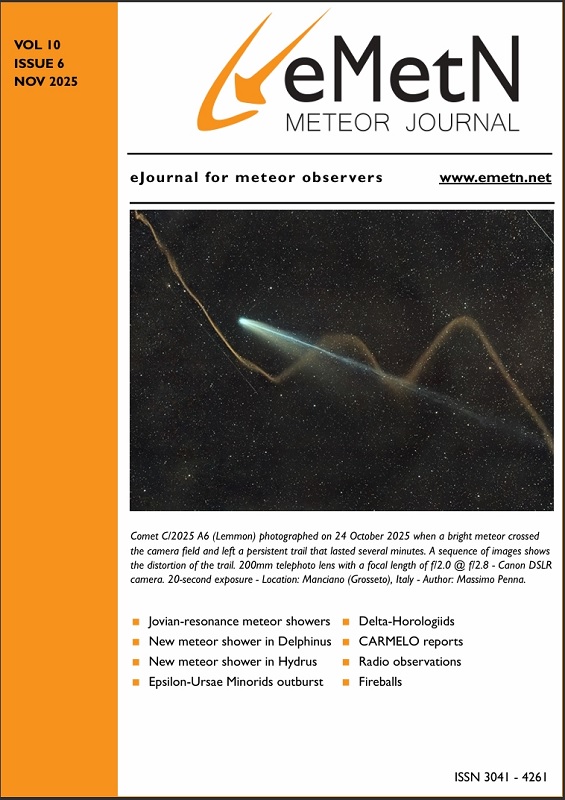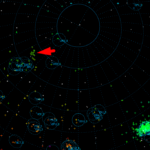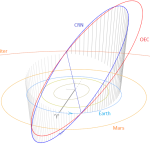A summary of the activity of the CAMS BeNeLux network during the month of November 2019 is presented. 21142 meteors were recorded, 9339 of which proved multiple station, or 44%. In total 3237 orbits were collected during this month. Unfavorable weather and technical problems at a number of CAMS stations reduced the results during this month.
1 Introduction
November is a typical autumn month with rather unstable weather over the BeNeLux. Completely clear nights are rare during this time of the year. However, during the long nights with 13 to 14 hours dark sky, it is also rare that clouds remain all night present. Very often clear gaps appear during which meteors can be registered. To be successful in a month like November is a matter of having the cameras operational. With most stations running Auto CAMS seven days on seven, still a lot of double station meteors can be registered during periods with unexpected clear sky.
2 November 2019 statistics
CAMS BeNeLux collected 21142 meteors of which only 9339 or 44% were multi-station, good for 3237 orbits. This is far less than last year when 53% of all meteors were multiple station and 6916 orbits were collected. November 2018 was an exceptional favorable month while this year we got a more or less normal month of November. To make things worse several CAMS stations struggled with hardware problems or were not operational. For instance, the major CAMS station Gronau, Germany with 8 cameras has been temporary unavailable since August because of renovation work. Terschelling with 4 cameras is still unavailable since a computer failure in January. Technical problems at the CAMS stations Heesch, Alphen a/d Rijn, Genk, Dourbes and Zoersel further reduced the chances to record multiple station meteors. All in all, with 3237 orbits obtained in these circumstances, it is still a success.
This month counted 10 nights with more than 100 orbits (16 in 2018). Only one night produced more than 500 orbits in a single night (6 in 2018). The best November night in 2019 was 7–8 with as many as 2556 meteors registered, 1585 of which were multi-station, good for 502 orbits in this single night. Only three nights remained without any orbits. The statistics of November 2019 are compared in Figure 1 and Table 1 with the same month in previous years since the start of CAMS BeNeLux in 2012. In 8 years, 179 November nights allowed to obtain orbits with a grand total of 19795 orbits collected during November during all these years together.
While November 2018 had 85 cameras at best and 75.3 on average, November 2019 had 77 cameras at best and 71.1 on average.

Figure 1 – Comparing November 2019 to previous months of November in the CAMS BeNeLux history. The blue bars represent the number of orbits, the red bars the maximum number of cameras running in a single night and the yellow bar the average number of cameras running per night.
Table 1 – November 2019 compared to previous months of November.
| Year | Nights | Orbits | Stations | Max. Cams | Min. Cams | Mean Cams |
| 2012 | 14 | 165 | 6 | 8 | – | 4.4 |
| 2013 | 13 | 142 | 10 | 26 | – | 9.8 |
| 2014 | 24 | 1123 | 14 | 33 | – | 21.1 |
| 2015 | 23 | 1261 | 15 | 47 | 10 | 29.8 |
| 2016 | 24 | 2769 | 19 | 56 | 19 | 42.2 |
| 2017 | 26 | 4182 | 22 | 88 | 57 | 74.2 |
| 2018 | 28 | 6916 | 21 | 85 | 59 | 75.3 |
| 2019 | 27 | 3237 | 20 | 77 | 60 | 71.1 |
| Total | 179 | 19795 |
3 Conclusion
November 2019 brought the usual autumn weather for the BeNeLux. Unfortunately, some major CAMS stations remain unavailable while several other stations had major or minor technical problems that prevented either to capture meteors, or to use the data of the meteors. Poor weather and technical problems resulted in a rather modest number of orbits.
Acknowledgment
Many thanks to all participants in the CAMS BeNeLux network for their dedicated efforts. Thanks to Carl Johannink for providing all the data on which this report is based. The CAMS BeNeLux team was operated by the following volunteers during the month of November 2019:
Hans Betlem (Leiden, Netherlands, CAMS 371, 372 and 373), Jean-Marie Biets (Wilderen, Belgium, CAMS 379, 380, 381 and 382), Martin Breukers (Hengelo, Netherlands, CAMS 320, 321, 322, 323, 324, 325, 326 and 327, RMS 328 and 329), Guiseppe Canonaco (Genk, RMS 3815), Bart Dessoy (Zoersel, Belgium, CAMS 397, 398, 804, 805, 806 and 888), Jean-Paul Dumoulin and Christian Walin (Grapfontaine, Belgium, CAMS 814 and 815, RMS 003814), Luc Gobin (Mechelen, Belgium, CAMS 390, 391, 807 and 808), Tioga Gulon (Nancy, France, CAMS 3900 and 3901), Robert Haas (Alphen aan de Rijn, Netherlands, CAMS 3360, 3361, 3362, 3363, 3364, 3365, 3366 and 3367), Robert Haas (Texel, Netherlands, CAMS 810, 811, 812 and 813), Robert Haas / Edwin van Dijk (Burlage, Germany, CAMS 801, 802, 821 and 822), Klaas Jobse (Oostkapelle, Netherlands, CAMS 3030, 3031, 3032, 3033, 3034, 3037, 3038 and 3039), Hervé Lamy (Dourbes, Belgium, CAMS 394 and 395), Hervé Lamy (Humain Belgium, CAMS 816), Hervé Lamy (Ukkel, Belgium, CAMS 393), Koen Miskotte (Ermelo, Netherlands, CAMS 351, 352, 353 and 354), Tim Polfliet (Gent, Belgium, CAMS 396), Steve Rau (Zillebeke, Belgium, CAMS 3850 and 3852), Paul and Adriana Roggemans (Mechelen, Belgium, CAMS 383, 384, 388, 389, 399 and 809, RMS 003830 and 003831), Hans Schremmer (Niederkruechten, Germany, CAMS 803) and Erwin van Ballegoij (Heesch, Netherlands,CAMS 347 and 348).





